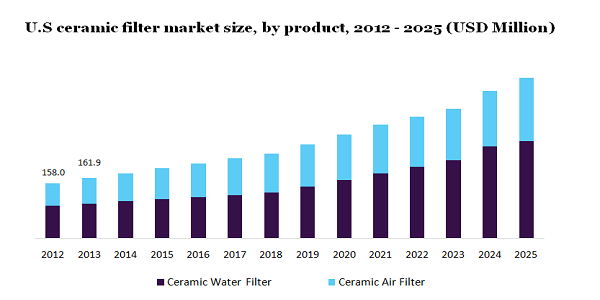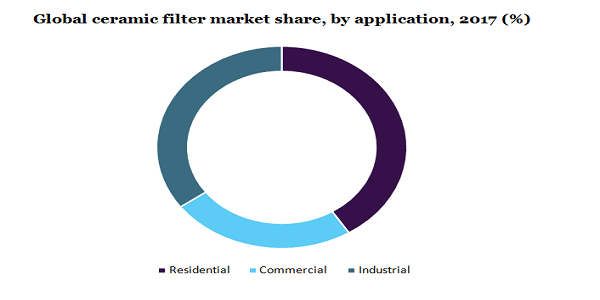- US: +1-408-610-2300
- Toll Free: +1-866-831-4085
- Become a Client
The global ceramic filter market size was worth USD 1.08 billion in 2017. The market is projected to grow with a 13.5% CAGR from 2018 to 2025. Stringent regulation regarding the filtration of water and growing awareness about drinking safe water is attributing to the growth of the market.
Various agencies across the globe such as Energy & Environmental Affairs (EEA), European Environment Agency (EEA), and Environmental Protection Agency (EPA) have set the guidelines related to water filtration and environmental pollution. Emphasizing the need for safe drinking water and mandatory government regulation regarding it is projected to proliferate the growth of the market.

The National Science Foundation (NSF) outlined the guidelines for water filtration that are used in commercial and residential applications. Ceramics filtration reduces water toxicity and makes it consumable.
Various government initiatives, aimed at encouraging sustainable development, are projected to supplement the market growth. Further, the introduction of nanotechnology in bio-ceramics filtration and filtration processes is estimated to drive market growth.
The growing population worldwide, especially in the Asia Pacific and Africa, has resulted in the scarcity of drinking water. This factor is encouraging consumers to focus on water treatment and conserve drinking water, thereby, fueling the market growth.
However, the high cost of a ceramic filter is anticipated to restrain the growth of the market. Increasing raw material cost is the major factor attributing to the high cost of the product. In addition, raw material prices are influenced by the increasing natural gas and crude oil prices, thus, adversely affecting the market growth.
Ceramic filter is used in various applications such as commercial, industrial and domestic. Its application ranges from treating wastewater of industries to filtering household water for drinking purposes. Various government and world bodies initiatives aimed at providing potable water are supplementing the growth of the ceramic filters market.
Disposal of industrial water is one of the prime concerns. Growing focus on reducing the ill effect caused by industrial water has led to its treatment, thereby, augmenting ceramics filter demand. In addition, these filters offer excellent cleaning properties than polymer filters, thus, being suitable for water disposable application.
Volatile organic compounds and toxic gases, which are released during industrial application, are considered harmful to the air. Favorable regulations aimed at curbing particulates and air pollutants are anticipated to bolster the product demand.
Rapidly growing urbanization and infrastructural development have resulted in a rise in construction activities across the globe. Stringent regulation regarding the use of air filters for the commercial structure is projected to supplement the growth of the commercial segment from 2018 to 2025.
In 2017, the residential segment held the largest market share with over 40%. The growing use of ceramics candles for water filtration in household applications is estimated to augment the growth of the market. This method is among one of the most useful methods and is widely used in many African countries.

In the industrial segment, this product is used in separating oils and suspended solids from wastewater in natural gas processing plants and oil refineries, petrochemical plants, and chemical plants. These products are chemical resistant and help in getting clear liquids.
Use of hot gas filters to protect equipment such as heat exchangers, turbines, and scrubbers from fouling and erosion, thereby, driving the product demand. Moreover, these filters also prevent condensation and de-sublimation, thus, gaining traction in the market.
Among all regions, MEA is projected to register the maximum growth with 15.7% CAGR owing to the growing demand for wastewater treatment and clean water in this region. In addition, surging investment in the petrochemical domain in the region is anticipated to augment the growth over the next few years.
The Asia Pacific is anticipated to register significant growth owing to rising demand from various industries. Further, increasing population and paucity of water in developing countries are likely to propel the growth of the market.
European market growth is attributed to increasing concern regarding the environment that led to the introduction of favorable regulations. On the other hand, North America is projected to witness comparatively low growth than other regions. However, government laws regarding the use of water filtration are estimated to positively affect market growth.
The ceramic filter market has witnessed a rapid decline in its growth owing to the outbreak of COVID-19. Several major countries have imposed lockdown, thereby, significantly reducing the production of the ceramic filter. The disrupted supply chain further caused the lack of raw materials, adversely affecting the market. However, lockdown restrictions have eased and various manufacturers have started their operation, albeit with protective measures and limited employee count. Amid the falling demand, industry players can focus on competitive pricing and the introduction of cost-effective products to acquire a larger customer base. Moreover, the economies of major countries have started to recover, which, in turn, is projected to spur the demand for ceramic filters from the residential segment.
Owing to the presence of several small and large players, the market is competitive in nature. Key players operating in the market are 3M, Glosfume Ltd., Anguil Environmental Systems Inc., and others. These players are integrated into the value chain as they supply raw materials, manufacture products, and distribute them globally.
Further, key strategic initiatives such as agreements, collaboration, joint venture, and launch of new products are the major differentiators and help companies in gaining competitive advantages. Additionally, growing R&D investment is further estimated to support the market growth.
|
Attribute |
Details |
|
The base year for estimation |
2017 |
|
Actual estimates/Historical data |
2012 - 2016 |
|
Forecast period |
2018 - 2025 |
|
Market representation |
Revenue in USD Million and CAGR from 2018 to 2025 |
|
Regional scope |
North America, Europe, Asia Pacific, Central & South America, Middle East & Africa |
|
Country scope |
U.S., Germany, U.K., China, India, Japan |
|
Report coverage |
Revenue forecast, company share, competitive landscape, and growth factors and trends |
|
15% free customization scope (equivalent to 5 analyst working days) |
If you need specific information, which is not currently within the scope of the report, we will provide it to you as a part of the customization |
This report forecasts revenue growth at global, regional, and country levels, and provides an analysis of the latest industry trends in each of the sub-segments from 2012 to 2025. For the purpose of this study, Million Insights has segmented the global ceramic filter market report on the basis of product, application, and region:
• Product Outlook (Revenue, USD Million, 2012 - 2025)
• Ceramic water filter
• Ceramic air filter
• Application Outlook (Revenue, USD Million, 2012 - 2025)
• Residential
• Commercial
• Industrial
• Hot gas Filtration
• Oil-water Separation
• Bio-Filtration
• Regional Outlook (Revenue, USD Million, 2012 - 2025)
• North America
• U.S.
• Europe
• Germany
• U.K.
• the Asia Pacific
• China
• India
• Japan
• Central & South America
• Middle East & Africa


Research Support Specialist, USA